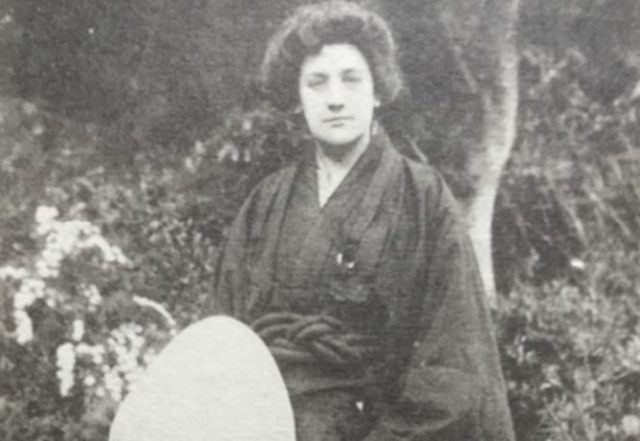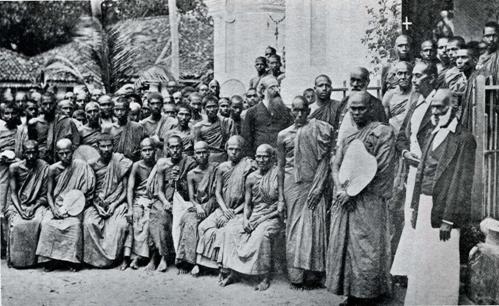|
Beatrice Erskine Lane Suzuki
Beatrice Erskine Lane Suzuki ( 1878–1939) was an American Theosophist, who was instrumental in promoting Theosophy in Japan. Lane Suzuki is often eclipsed by her famous husband, Japanese writer and scholar D. T. Suzuki. Born in Newark, New Jersey, Lane was educated at Radcliffe College, where one of her tutors was William James, graduating in 1898. She also completed a Master of Arts degree in social work at Columbia University in 1908.Algeo 2007 Lane married Suzuki in 1911. The Suzukis, along with her mother, joined the Tokyo International Lodge of the Theosophical Society in 1920. Lane Suzuki fulfilled various official roles in the Lodge. Lane Suzuki and her husband later founded the Mahayana Lodge with a more explicitly Buddhist focus. Letters from the time speak of the difficulty of spreading Theosophy in Buddhist Japan, since Theosophy draws heavily on Buddhism. Lane Suzuki published numerous books on Buddhism and Japanese culture. These have seen many reprints and edit ... [...More Info...] [...Related Items...] OR: [Wikipedia] [Google] [Baidu] |
Beatrice Lane
Beatrice may refer to: * Beatrice (given name) Places In the United States * Beatrice, Alabama, a town * Beatrice, Humboldt County, California, a locality * Beatrice, Georgia, an unincorporated community * Beatrice, Indiana, an unincorporated community * Beatrice, Nebraska, a city * Beatrice, West Virginia, an unincorporated community Elsewhere * Beatrice, Queensland, a locality in the Tablelands Region, Queensland, Australia * Beatrice, Zimbabwe, a village Arts and entertainment * ''Beatrice'' (1919 film), an Italian historical film * ''Beatrice'' (1987 film), a French-Italian historical drama * ''Beatrice'' (radio programme), Sveriges Radio's 1989 Christmas calendar * Beatrice (band), a Hungarian rock band * "Beatrice", a song from Sam Rivers' time with Blue Note, on the 1964 album ''Fuchsia Swing Song'' * Beatrice (singer), Béatrice Poulot (born 1968), French singer Literature * Beatrice Portinari, principal inspiration for Dante Alighieri's ''Vita Nuova ''La ... [...More Info...] [...Related Items...] OR: [Wikipedia] [Google] [Baidu] |
Buddhism And Theosophy
Theosophical teachings have borrowed some concepts and terms from Buddhism. Some theosophists like Helena Blavatsky, Helena Roerich and Henry Steel Olcott also became Buddhists. Henry Steel Olcott helped shape the design of the Buddhist flag. Tibetan Buddhism was popularised in the West at first mainly by Theosophists including Evans-Wentz and Alexandra David-Neel. Blavatsky sometimes compared Theosophy to Mahayana Buddhism. In ''The Key to Theosophy'' she writes: The Theosophists as Buddhists and Buddhologists The Founders of the Theosophical Society 25 May 1880 Blavatsky and Olcott embraced Buddhism: they publicly took in Galle the Refuges and Pancasila from a prominent Sinhalese bhikkhu. Olcott and Blavatsky (she received US citizenship previously) were the first Americans who were converted to Buddhism in the traditional sense. In Buddhology there is an idea that the "Theosophical Buddhists" were the forerunners of all subsequent Western, or, as they were called, "w ... [...More Info...] [...Related Items...] OR: [Wikipedia] [Google] [Baidu] |
Writers From Newark, New Jersey
A writer is a person who uses written words in different writing styles and techniques to communicate ideas. Writers produce different forms of literary art and creative writing such as novels, short stories, books, poetry, travelogues, plays, screenplays, teleplays, songs, and essays as well as other reports and news articles that may be of interest to the general public. Writers' texts are published across a wide range of media. Skilled writers who are able to use language to express ideas well, often contribute significantly to the cultural content of a society. The term "writer" is also used elsewhere in the arts and music, such as songwriter or a screenwriter, but also a stand-alone "writer" typically refers to the creation of written language. Some writers work from an oral tradition. Writers can produce material across a number of genres, fictional or non-fictional. Other writers use multiple media such as graphics or illustration to enhance the communication of thei ... [...More Info...] [...Related Items...] OR: [Wikipedia] [Google] [Baidu] |
Theosophists
Theosophy is a religion established in the United States during the late 19th century. It was founded primarily by the Russian Helena Blavatsky and draws its teachings predominantly from Blavatsky's writings. Categorized by scholars of religion as both a new religious movement and as part of the occultist stream of Western esotericism, it draws upon both older European philosophies such as Neoplatonism and Asian religions such as Hinduism and Buddhism. As presented by Blavatsky, Theosophy teaches that there is an ancient and secretive brotherhood of spiritual adepts known as the Masters, who—although found around the world—are centered in Tibet. These Masters are alleged by Blavatsky to have cultivated great wisdom and supernatural powers, and Theosophists believe that it was they who initiated the modern Theosophical movement through disseminating their teachings via Blavatsky. They believe that these Masters are attempting to revive knowledge of an ancient religion once fou ... [...More Info...] [...Related Items...] OR: [Wikipedia] [Google] [Baidu] |
Zen Buddhism Writers
Zen ( zh, t=禪, p=Chán; ja, text= 禅, translit=zen; ko, text=선, translit=Seon; vi, text=Thiền) is a school of Mahayana Buddhism that originated in China during the Tang dynasty, known as the Chan School (''Chánzong'' 禪宗), and later developed into various sub-schools and branches. From China, Chán spread south to Vietnam and became Vietnamese Thiền, northeast to Korea to become Seon Buddhism, and east to Japan, becoming Japanese Zen. The term Zen is derived from the Japanese pronunciation of the Middle Chinese word 禪 (''chán''), an abbreviation of 禪那 (''chánnà''), which is a Chinese transliteration of the Sanskrit word ध्यान ''dhyāna'' ("meditation"). Zen emphasizes rigorous self-restraint, meditation-practice and the subsequent insight into nature of mind (見性, Ch. ''jiànxìng,'' Jp. '' kensho,'' "perceiving the true nature") and nature of things (without arrogance or egotism), and the personal expression of this insight in d ... [...More Info...] [...Related Items...] OR: [Wikipedia] [Google] [Baidu] |
American Zen Buddhists
American(s) may refer to: * American, something of, from, or related to the United States of America, commonly known as the "United States" or "America" ** Americans, citizens and nationals of the United States of America ** American ancestry, people who self-identify their ancestry as "American" ** American English, the set of varieties of the English language native to the United States ** Native Americans in the United States, indigenous peoples of the United States * American, something of, from, or related to the Americas, also known as "America" ** Indigenous peoples of the Americas * American (word), for analysis and history of the meanings in various contexts Organizations * American Airlines, U.S.-based airline headquartered in Fort Worth, Texas * American Athletic Conference, an American college athletic conference * American Recordings (record label), a record label previously known as Def American * American University, in Washington, D.C. Sports teams Soccer * Ba ... [...More Info...] [...Related Items...] OR: [Wikipedia] [Google] [Baidu] |
1939 Deaths
This year also marks the start of the Second World War, the largest and deadliest conflict in human history. Events Below, the events of World War II have the "WWII" prefix. January * January 1 ** Third Reich *** Jews are forbidden to work with Germans. *** The Youth Protection Act was passed on April 30, 1938 and the Working Hours Regulations came into effect. *** The Jews name change decree has gone into effect. ** The rest of the world *** In Spain, it becomes a duty of all young women under 25 to complete compulsory work service for one year. *** First edition of the Vienna New Year's Concert. *** The company of technology and manufacturing scientific instruments Hewlett-Packard, was founded in a garage in Palo Alto, California, by William (Bill) Hewlett and David Packard. This garage is now considered the birthplace of Silicon Valley. *** Sydney, in Australia, records temperature of 45 ˚C, the highest record for the city. *** Philipp Etter took over as Swi ... [...More Info...] [...Related Items...] OR: [Wikipedia] [Google] [Baidu] |
1870s Births
Year 187 ( CLXXXVII) was a common year starting on Sunday (link will display the full calendar) of the Julian calendar. At the time, it was known as the Year of the Consulship of Quintius and Aelianus (or, less frequently, year 940 ''Ab urbe condita''). The denomination 187 for this year has been used since the early medieval period, when the Anno Domini calendar era became the prevalent method in Europe for naming years. Events By place Roman Empire * Septimius Severus marries Julia Domna (age 17), a Syrian princess, at Lugdunum (modern-day Lyon). She is the youngest daughter of high-priest Julius Bassianus – a descendant of the Royal House of Emesa. Her elder sister is Julia Maesa. * Clodius Albinus defeats the Chatti, a highly organized German tribe that controlled the area that includes the Black Forest. By topic Religion * Olympianus succeeds Pertinax as bishop of Byzantium (until 198). Births * Cao Pi, Chinese emperor of the Cao Wei state (d. 226) * G ... [...More Info...] [...Related Items...] OR: [Wikipedia] [Google] [Baidu] |
Theosophy (Blavatskian)
Theosophy is a religion established in the United States during the late 19th century. It was founded primarily by the Russian Helena Blavatsky and draws its teachings predominantly from Blavatsky's writings. Categorized by scholars of religion as both a new religious movement and as part of the occultist stream of Western esotericism, it draws upon both older European philosophies such as Neoplatonism and Asian religions such as Hinduism and Buddhism. As presented by Blavatsky, Theosophy teaches that there is an ancient and secretive brotherhood of spiritual adepts known as the Masters, who—although found around the world—are centered in Tibet. These Masters are alleged by Blavatsky to have cultivated great wisdom and supernatural powers, and Theosophists believe that it was they who initiated the modern Theosophical movement through disseminating their teachings via Blavatsky. They believe that these Masters are attempting to revive knowledge of an ancient religion once fou ... [...More Info...] [...Related Items...] OR: [Wikipedia] [Google] [Baidu] |
Timeline Of Zen Buddhism In The United States
Below is a timeline of important events regarding Zen Buddhism in the United States. Dates with "?" are approximate. Events Early history * 1893: Soyen Shaku comes to the United States to lecture at the World Parliament of Religions held in Chicago * 1905: Soyen Shaku returns to the United States and teaches for approximately one year in San Francisco * 1906: Sokei-an arrives in San Francisco * 1919: Soyen Shaku dies on October 29 in Japan * 1922: Zenshuji Soto Mission is established in the Little Tokyo section of Los Angeles, California * 1922: Nyogen Senzaki begins teaching in California with his "floating zendo" * 1930: Sokei-an establishes the Buddhist Society of America (now First Zen Institute of America) * 1932: Dwight Goddard authors ''A Buddhist Bible'', an anthology focusing on Chinese and Japanese Zen scriptures * 1938: Ruth Fuller Sasaki became a principal supporter of the Buddhist Society of America (later known as the First Zen Institute of America), * 1939 ... [...More Info...] [...Related Items...] OR: [Wikipedia] [Google] [Baidu] |
Japanese Zen
:''See also Zen for an overview of Zen, Chan Buddhism for the Chinese origins, and Sōtō, Rinzai school, Rinzai and Ōbaku for the three main schools of Zen in Japan'' Japanese Zen refers to the Japanese forms of Zen, Zen Buddhism, an originally Buddhism in China, Chinese Mahāyāna school of Buddhism that strongly emphasizes Dhyāna in Buddhism, dhyāna, the Meditation, meditative training of awareness and equanimity. This practice, according to Zen proponents, gives insight into one's Buddha-nature, true nature, or the Śūnyatā, emptiness of inherent existence, which opens the way to a enlightenment in Buddhism, liberated way of living. History Origins According to tradition, Zen originated in India, when Gautama Buddha Flower Sermon, held up a flower and Mahākāśyapa smiled. With this smile he showed that he had understood the wordless essence of the dharma#Buddhism, dharma. This way the dharma was transmitted to Mahākāśyapa, the second patriarch of Zen. The ... [...More Info...] [...Related Items...] OR: [Wikipedia] [Google] [Baidu] |





.jpg)


